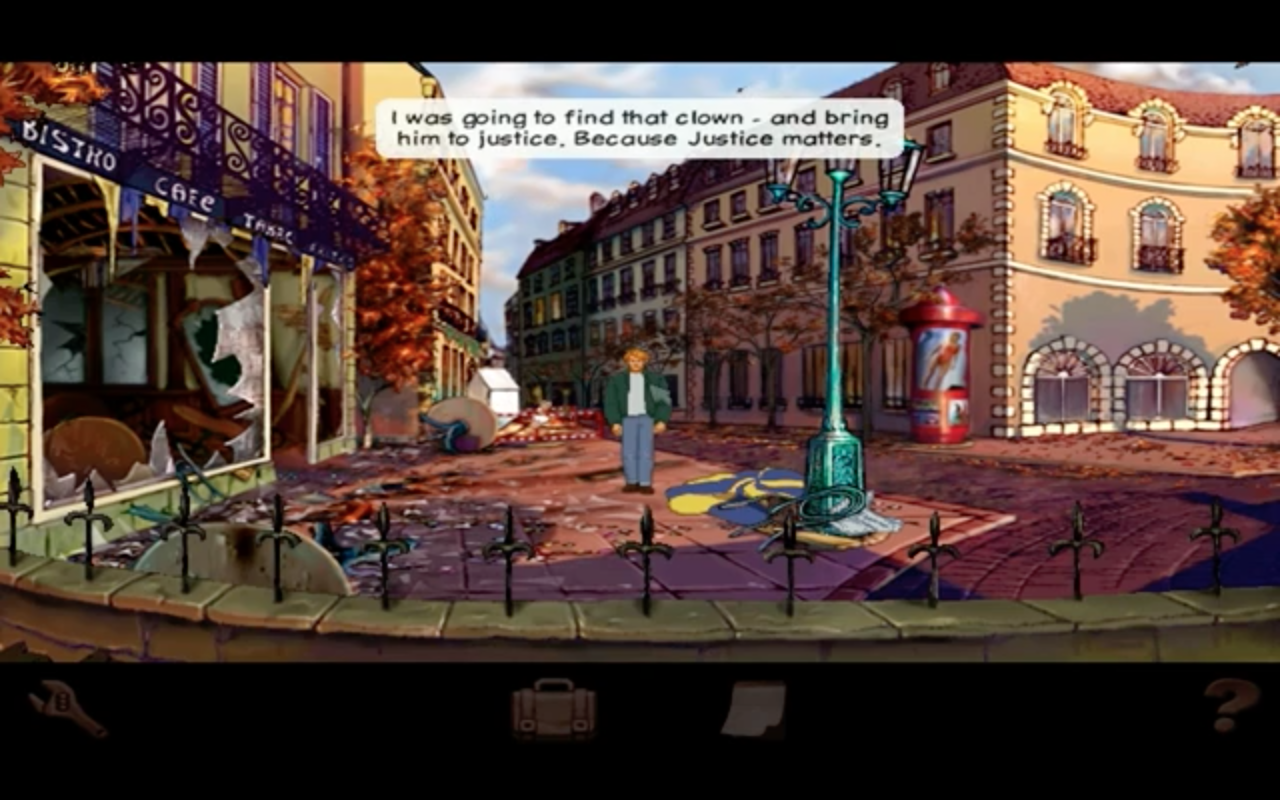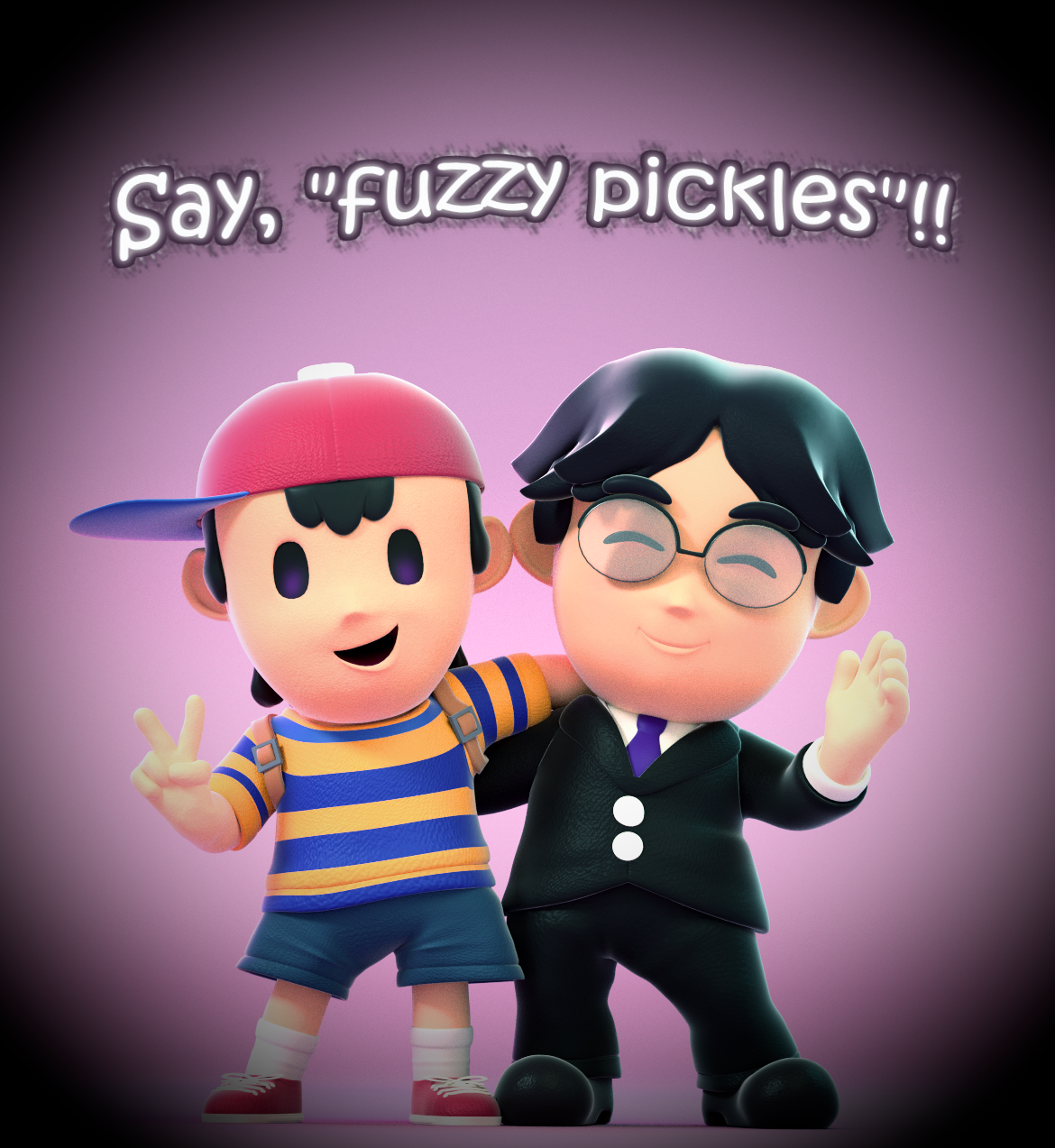My first encounter with Broken Sword: The Shadow of the Templars was many, many years ago around Christmas time. However, this isn’t some rose-tinted Christmas tale, no, it’s more like something that just randomly happened. You see, my parents bought both my brother and I random video games that year as presents, and well, bless my parents for trying, but all their choices were strange and kind of bad. Among the many odd choices and C-tier games that we would never play, was the port of Broken Sword for the GBA. This was the GBA game my brother got, while I got some really awkward and poorly controlled Monster Truck GBA game. I remember being kind of jealous of my brother since I figured a game with “Sword” in its title must be some Zelda-like game, or some sweet RPG. Much later I would realize it ….. definitely was not, but before then I remember asking my brother what it was like. His description? Some freaky clown blows people up, and you read a lot. A little bit later, the game would slip through the crack and I never thought about it again. Until now that is.
| (Also amazingly after all these years I somehow managed to find the game when preparing to write this review — it still works too!) |
Fast forward to 2015, and I ended up right in the middle of my point ’n’ click binge. Nowadays, I play through so many of these games on my computer and really love the genre, so of course, I became more familiar with the Broken Sword series and knew I would need to play it, eventually grabbing the entire series for real cheap at GOG.com during the big Summer sales event. The first Broken Sword game was released on a lot of platforms including Windows, Mac, and PSOne, but it also got that GBA port (maybe demake/downgrade might be a better term?), and an enhanced iOS, Android, PC/Mac/Linux, Nintendo Wii and Nintendo DS release as well. The enhanced version started on the Nintendo consoles and was a Director’s Cut of the game, released somewhat close to the 15th anniversary (a little bit earlier) and most likely meant to cash-in on the resurgence of the adventure game genre that were profitable on those two consoles (Ace Attorney on DS, especially), then later landing on the computer and mobile markets. The Director’s Cut version is what I played on my Mac, which was mostly similar to the original release of the game in 1996, with some things added, a few things taken out, and some small amount of dialogue changed a little.
So now that I love the genre and actually wanted to play the game, what’s my opinion? Well, for 1996 it’s easy to see that Broken Sword was definitely impressive; it’s full of lots of animation, voice acting, hand drawn backgrounds (by Don Bluth animators, no less!) that were painted-in digitally, and dynamic camera angel shots with a lot of sweeping movement—it’ obvious there was a real sense of direction and storyboarding with the imagery in the game. I even really liked the artwork for the character portraits (an added feature to the Directors’ Cut was the art drawn by comic book artist Dave Gibbons (Watchmen)). The puzzles too, aged really well and followed basic human logic and could be solved without much headaches, which is always appreciated in a genre full of psychotic puzzles (I’m looking at you, Gabriel Knight 3). But besides the presentation and puzzles, I thought the game aged badly. One of the biggest hurdles to get over for the game was definitely the voice acting which was … not good. I don’t want to say straight-out bad per se, since some actors help to outweigh others, with the lead character George Stobbart sounding pretty good, but some of those other, bad actors really drag down the good ones.
| 2001's GBA Release |
| Original 1996 PC Release |
 |
| 2009's Director's Cut Release |
The biggest point of contention being the other lead in the game Nicole "Nico" Collard. Nico’s voice actress is terrible! She’s a main character and her voice is absolutely unbearable to listen to. She comes off sounding very old, like a grandmother, and half the time reminds me of the classic Bible Black dub that’s known in infamy for its grandma voice high school girls. While I can understand and empathize with the fact that some of Nico’s wooden nature may come from both the dubbing's age and the fact of her character being French and trying to talk in English (with an accent),
it’s still just so bad that I can’t stand her. No matter the reason for it, Nico just sounds really awful, and brings down the entire atmosphere of the game whenever she is on screen. Playing as her was always the worst part of the game for me that I just wanted to rush through so I didn’t have to listen to her horrible sounding voice.
Nico’s segments in the game felt very awkward to begin with, however. Not only were they obnoxious from her actress’s terrible acting, but they also felt very disconnected from the main plot with George, and ultimately unnecessary. At first I didn’t think much of it, until I got to the ending and realized how little pay-off there really is with her segments. I later learned that these segments were added on for the Director’s Cut, and … yeah that explains so much. The small pay-off—essentially Nico decides she’ll never tell anyone what she was doing, even George—really makes a lot of sense when you realize it was shoved in their retroactively. Some people may like that they got to see more of Nico, and that she was no longer just a love-interest but also had her own story, but it just felt like filler to me, really uneventful filler that messed with the pacing of the overall narrative of the game and gave you nothing of value in the end since Nico decides to never tell anyone about her little misadventures anyways.
That is not to say there weren’t problems with the narrative proper, either though. George’s quest throughout Europe wasn’t without its own problems. It took a while for it to sink in for me since the game starts with such a serious tone, but then later becomes so goofy. Broken Sword is suppose to be a funny game! Ah-ha! I get it now. The awkward juxtaposition of horrible murders and serious down-to-earth art design with goofy side-characters that are what you would expect out of Capcom’s Ace Attorney games, really gave me whiplash at first. But yes, the story is chuck full of humor, and in its defense once I got over the whiplash I was able to see that a lot of the game’s humor is great. Every NPC and side-character is really well written and interesting to talk to, not to mention rather funny.
George himself is really likable, with a goofy sense of adventure, snide snark to the characters around him, and a long running joke that he can fit anything into the inside pocket of his jacket (with humorous animation of him shoving large objects in there). These do help get over the fact that the overall story about chasing the treasure of the Knight’s Templar is so average. Templar stories are overdone to death now, and Broken Sword dose get some free-pass since it beat Dan Brown and all the other overdone stories by at least 4 years, but in a post-Da Vinci Code obsessed world, it still hampered the game for me. Plus, the pay-off to the Templar story felt sloppy anyways. I recommend playing this one for the characters who aged a lot better and are still funny 19 years later and not so much the plot that lost a lot of its grit and interest.
The European development team behind Broken Sword, Revolution, started out in 1990 with a clear goal in mind: to challenge the American ran market of Sierra and LucasArts who controlled the point ’n’ click industry. Between the six years since their start and the creation of Broken Sword they created another well respected game, Beneath the Steel Sky, and the engine they needed to take on the giants, their Virtual Theater engine. Broken Sword had fluid animation and hand-drawn backgrounds, as well as a lot of love put into it, which was something the other guys didn’t really have at the time of Broken Sword’s release (well sans the love part, they had that).
While I think overall Broken Sword has not aged as well as some of the Sierra games its creators were trying so hard to beat, that it still managed to maintain an unique identity more than 19 years later. Add in the fact that so much of Sierra went into disarray and was side-lined for so many years (we’re just now finally seeing the rebirth of the King’s Quest series) it is quite a feat that Broken Sword was able to maintain a relatively consistent release schedule even landing a PS4 and Xbox One port for their most recent 2013 entry Broken Sword 5. It’s really something to admire that Revolution could keep the series going like it did. So yes, it was a bit of an awkward start for me, and not without my own complaints, but I ended up enjoying the beginning of this series, and am looking forward to trying out the next four games.


